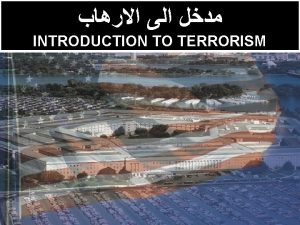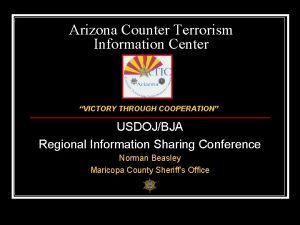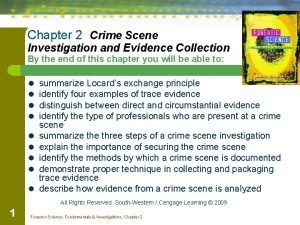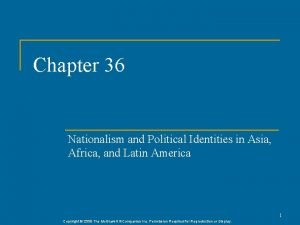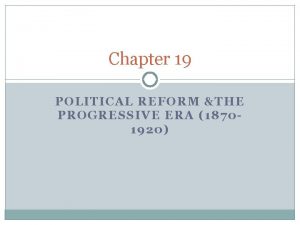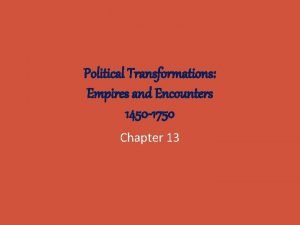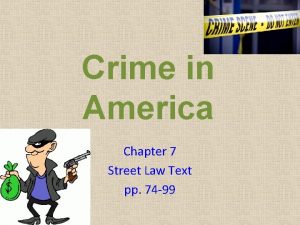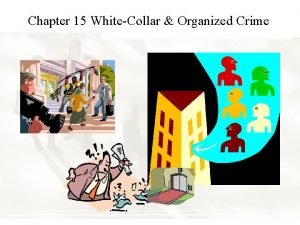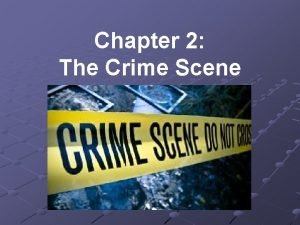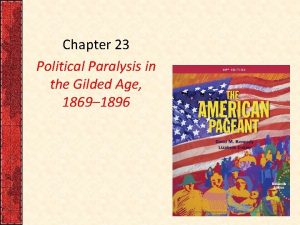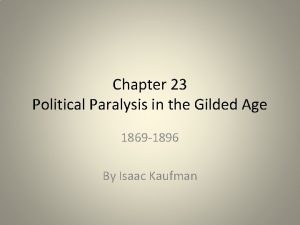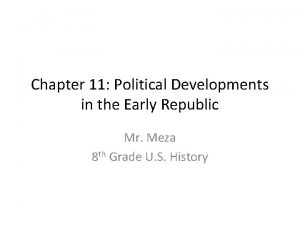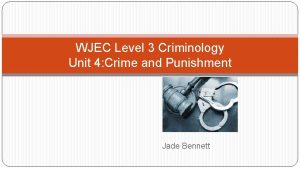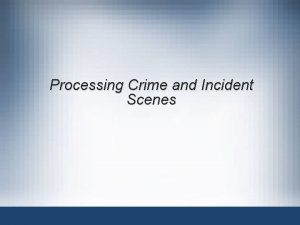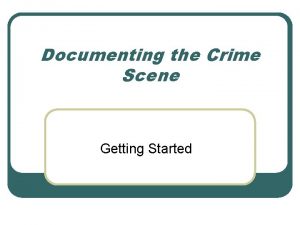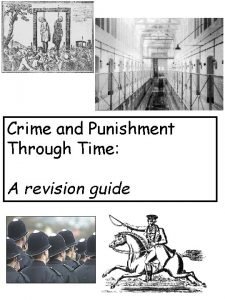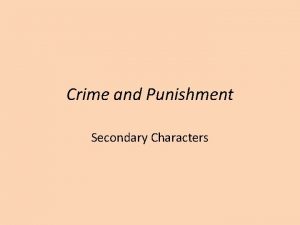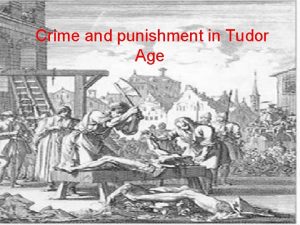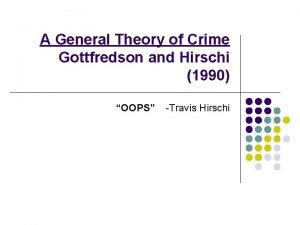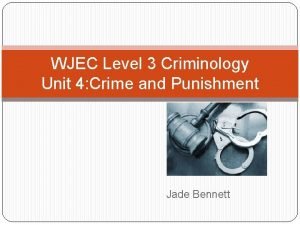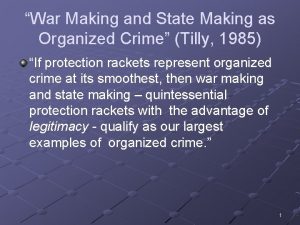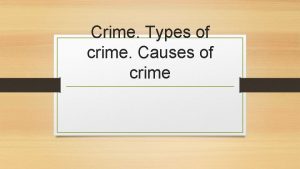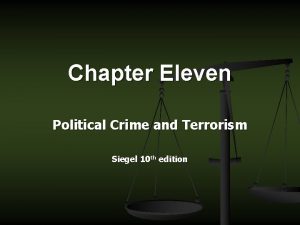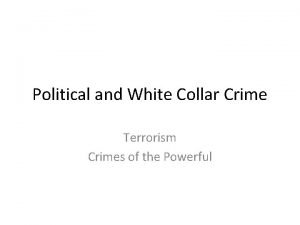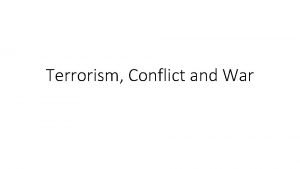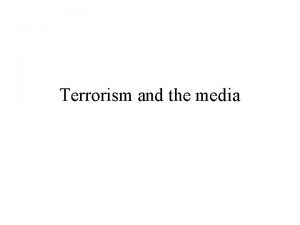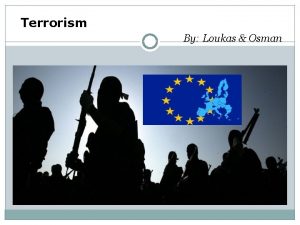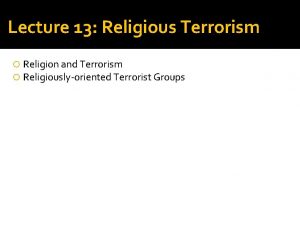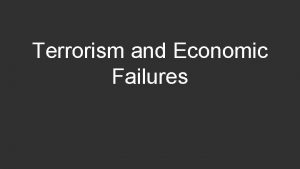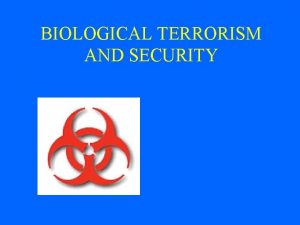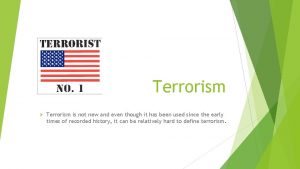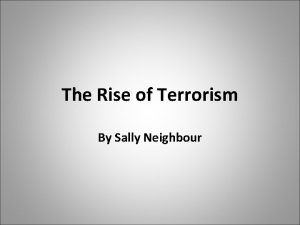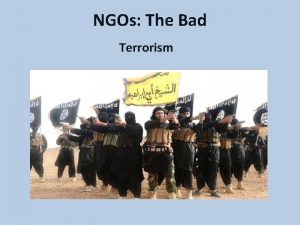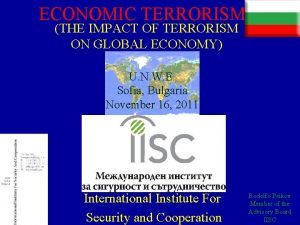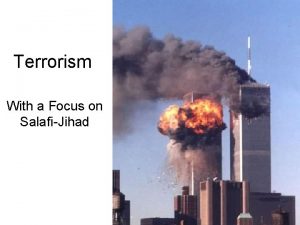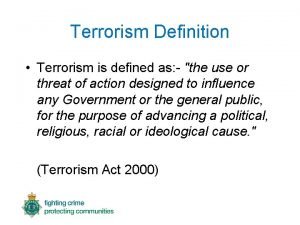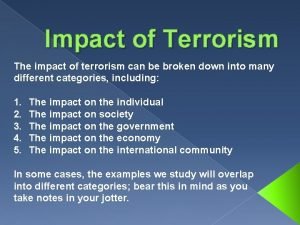Chapter 11 Political Crime and Terrorism Political Crime




































- Slides: 36

Chapter 11 Political Crime and Terrorism

Political Crime l l This term is used to signify illegal acts that are designed to undermine an existing government and threaten its survival. These crimes can include both violent and nonviolent acts and range in seriousness from dissent, treason and espionage to violent acts such as terrorism or assassination.

Nature of Political Crimes l l Political criminals and political crimes may stem from religious or ideological sources. Political crimes typically occupy a gray area between conventional and outlawed behavior because their motivations shift between selfish personal needs and selfless, noble and/or altruistic desires.

Goals of Political Crime Intimidation (of opponents) l Revolution (overthrow of existing government) l Profit (selling secrets or trafficking in stolen arms and munitions) l Conviction (belief that crimes will help society) Pseudo-conviction (concealing criminal motivations behind mask of conviction and altruism) l

The Road to Becoming a Political Criminal l Typically a pattern of stages: l l Stage 1: “It’s not right”—things are not as they should be. Stage 2: “It’s not fair”—some form of injustice for some individuals or groups. Stage 3: “It’s your fault”—a person or group must be held accountable for the extremists’ displeasure. Stage 4: “You’re evil”—dehumanizes person or group and justifies aggression.

Types of Political Crimes l Election Fraud—Illegal interference with the process of election. Forms of fraud include: l l l Intimidation Disruption Misinformation Registration fraud Vote buying

Types of Political Crimes l l Treason—an act of disloyalty to one’s nation or state. Helping or cooperating with an enemy in time of war is considered treason. Creating or recruiting a military force to help a foreign nation overthrow the government is treason. Many nation have applied the death penalty to those who have committed treasonous acts.

Types of Political Crimes l Espionage (spying)—obtaining information about a government, organization or society that is considered secret or confidential without the permission of the holder of the information. l l Industrial espionage—typically bribing employees to reveal trade secrets Foreign industrial espionage—foreign agents (spies) causes problems for both companies and the military.

Types of Political Crimes l The 1996 Economic Espionage Act criminalizes theft of trade secrets by both foreign agents and domestic spies.

State Political Crime l These crimes are committed by state authorities against the people they are supposed to serve. Five varieties are: l l l Political corruption Illegal domestic surveillance Human rights violations State violence (i. e. , torture/imprisonment) State-corporate crime

State Political Crime l l l The most controversial state political crime is the use of torture (including waterboarding) to gain information from suspected political criminals. This method is usually justified on the belief of imminent danger (ticking bomb scenario). A 2008 case. Boumediene et al. v Bush, President of the U. S. , et al. found that incarcerated terrorists are entitled to the legal process (eligibility to protection of habeas corpus) of the U. S. courts.

State Political Crime l “Torture warrant”, proposed by legal scholar, Alan Dershowitz, should be created. l l l To be issued only by a judge if: there is an absolute need to obtain immediate information in order to save lives and, there is probable cause that the suspect has such information and is unwilling to reveal it to law enforcement officers.

Terrorism l l This political act must have the intent to disrupt and change the government and must not be merely a common-law crime committed for greed or egotism. It usually involves the illegal use of force against innocent people to achieve a political objective.

Terrorism l While there are several definitions of terrorism, the United Nations has a comprehensive one; the following is an excerpt: l Terrorism is an anxiety-inspiring method of repeated violent action, employed by (semi-)a clandestine individual, group or state actors, for idiosyncratic, criminal or political reasons, whereby the direct targets of violence are not the main targets. The immediate human victims of violence are generally chosen randomly or selectively from a target population and serve as message generators.

Terrorism l l Most terrorist groups subdivide their members into terror cells, some are based on location, employment or family membership; others are based on function. The terms terrorist and guerilla are used interchangeably, but, most often terrorists are an urban phenomenon while guerillas operate in rural areas.

Terrorism l l l Terrorists and insurgents are also distinct groups. Insurgents may engage in violence, they do not necessarily need to use terror to meet their goals; often they use nonviolent methods or political tactics. Insurgents, unlike terrorists, require support of a significant portion of the population.

Terrorism l l l There is also a difference between terrorists and revolutionaries. A revolution is usually a civil war fought between nationalists and a sovereign power in control of the land or between the existing government and local groups. Revolutionaries may engage in violent acts or nonviolent methods, such as urban protests and threats

Brief History of Terrorism l Religious roots: the first terrorist acts were committed by members of minority religious groups to: l l l gain the right to practice their own form of religion, establish supremacy of their own religion over others or to meet the requirements of the gods they worshipped.

Brief History of Terrorism l Conquered populations used force and violence to keep their right to worship, i. e. , Zealots, Hebrew warrior groups, were active during the Roman occupation of Palestine during the first century.

Brief History of Terrorism l l Political Roots: when rulers had absolute power, terrorist activities occurred in order to gain political rights. Example: Reign of Terror during the French Revolution. Since WWII, terrorism has become a farreaching weapon capable of effects globally and a significant tool of diplomacy and international power.

Contemporary Forms of Terrorism l l Revolutionary Terrorists—groups attempting to replace those in power. Political Terrorists—groups attempting to destroy anyone who opposes the terrorists’ political ideology. Right-wing Political Groups—heavily armed, such as white supremacists. Left-wing Political Groups—challenging the existing power structure, such as Black Panthers.

Contemporary Forms of Terrorism l l Eco-terrorists—domestic political terror groups involved in violent actions to protect the environment. Breeding Ranches and Animal Liberation— groups who attempt to challenge those profiting from abused and/or neglected animals.

Nationalist Terrorism l Promotion of interests of minority ethnic or religious group that believes it has been persecuted under majority rule and wishes to create its own independent homeland. Examples include: Hezbollah, Hamas, al. Qaeda and the Chinese Uyghur group.

Retributive Terrorism l Differ from guerrillas, revolutionaries and other terrorists but still invoke violence to achieve their goals. Researchers offer several views of these groups: l l Coercion hypotheses—to cause pain (casualties) and fright to the U. S. in order for their will to prevail. Damage hypothesis—to damage the U. S. economy to weaken its ability to intervene in international affairs.

Retributive Terrorism l l Rally hypothesis—violence is used to attract the attention of recruits and supporters Franchise hypothesis—Jihadist’ violence is in pursuit of their own, usually local, goals.

State-sponsored Terrorism l Occurs when a repressive government forces its citizens into obedience, oppresses minorities and stifles political dissent. Examples include: l Colombia, Iraq, and Sudan

Cult Terrorism l l Leaders demand that followers prove their loyalty through violence or intimidation. Destructive in nature, members participate in severe discipline and commit violent acts.

Criminal Terrorism l l Terrorist groups may become involved in crimes such as drug dealing, kidnapping and selling nuclear materials. These activities are so profitable that they replace the group’s original goals.

Formation of Terrorist Groups l l Typically formed as networks, loosely organized groups in different locales that can coalesce for large scale operations. They evolve and expand often develop a hierarchical form with a leader at the top.

Terrorist Motivation l l No single personality or behavioral trait in the majority of terrorists. However, terrorists are often psychologically abnormal, suffer from alienation, are usually well educated, may not be poor or oppressed and have extreme religious and/or ideological beliefs.

Response to Terrorism in the U. S. l l A Director of National Intelligence coordinates data from the nation’s primary intelligencegathering agencies, such as the CIA, FBI and the Pentagon. Law enforcement agencies also have plans to combat terrorist attacks on the state and local levels as well as the federal level.

Department of Homeland Security l l The mission of this agency is to prevent terrorist attacks within the U. S. , to reduce vulnerability to terrorism and to minimize damage should attacks occur. This agency oversees border and transportation security, emergency preparedness and response, chemical, biological, radiological and nuclear countermeasures, and information analysis and infrastructure protection.

The Law—USA Patriot Act l l Created to give new powers to domestic law enforcement and international intelligence agencies to fight terrorism, to expand the definition of terrorist acts and to alter sanctions for violent terrorism. Expanded are tools of surveillance—wiretaps, search warrants, pen/trap orders and subpoenas.

The Law—USA Patriot Act l l l By expanding the definition of terrorism, the government may monitor more closely those suspected of aiding terrorists. The U. S. attorney general may detain and deport noncitizens with little or no judicial review. Possible civil rights violations concern civil libertarians and other citizens as well.

Countering Terror l Suggestions for defeating jihadist groups include, attacking the ideological underpinnings of global jihadism, severing ideological and other links between terrorist groups and strengthening the capabilities of front-line states to counter local jihadist threats.

Countering Terror l Strategic principles suggested: l l l l l Destroy the jihadist enterprise. Conserve resources for a long war. Wage more-effective political warfare. Break the cycle of jihadism. Impede recruitment. Encourage defections and facilitate exists. Persuade detainees to renounce terrorism. Maintain international cooperation. Reserve the right to retaliate—a muscular deterrent.
 Terrorism definition
Terrorism definition Terrorism
Terrorism Terrorism
Terrorism Nato definition terrorism
Nato definition terrorism Arizona counter terrorism information center
Arizona counter terrorism information center Edward snowden apush
Edward snowden apush Chapter 7 deviance crime and social control
Chapter 7 deviance crime and social control Chapter 2 crime scene investigation and evidence collection
Chapter 2 crime scene investigation and evidence collection Chapter 35 nationalism and political identities in asia
Chapter 35 nationalism and political identities in asia Chapter 36 nationalism and political identities in asia
Chapter 36 nationalism and political identities in asia Chapter 19 political reform and the progressive era
Chapter 19 political reform and the progressive era Chapter 5 political transformations empires and encounters
Chapter 5 political transformations empires and encounters Chapter 3 political and economic analysis
Chapter 3 political and economic analysis Chapter 3 political and economic analysis
Chapter 3 political and economic analysis Chapter 7 crime in america
Chapter 7 crime in america Born a crime chapter 15
Born a crime chapter 15 Youtube.com
Youtube.com Chapter 23 political paralysis in the gilded age
Chapter 23 political paralysis in the gilded age Chapter 23 political paralysis in the gilded age
Chapter 23 political paralysis in the gilded age Chapter 11 political developments in the early republic
Chapter 11 political developments in the early republic Chapter 23 political paralysis in the gilded age
Chapter 23 political paralysis in the gilded age Criminology unit 4
Criminology unit 4 Crime scene factoring and quadratic functions answer key
Crime scene factoring and quadratic functions answer key Crime and deviance sociology revision
Crime and deviance sociology revision Rational choice theory
Rational choice theory Processing crime and incident scenes
Processing crime and incident scenes Crime scene factoring and quadratic functions answer key
Crime scene factoring and quadratic functions answer key Transnational crime and the developing world
Transnational crime and the developing world Sketch all serious crime and crash scenes
Sketch all serious crime and crash scenes Crime and punishment revision guide
Crime and punishment revision guide Crime and punishment characters
Crime and punishment characters Crime and punishment in tudor times
Crime and punishment in tudor times Difference between crime and deviance
Difference between crime and deviance Gottfredson and hirschi (1990)
Gottfredson and hirschi (1990) Ac1.1 criminology unit 1
Ac1.1 criminology unit 1 War making and state making as organized crime
War making and state making as organized crime Medieval crime and punishment facts
Medieval crime and punishment facts


